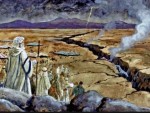 民数记第五课:罪上加罪:民数记十五至十七章
民数记第五课:罪上加罪:民数记十五至十七章
摩西是《圣经》里的重要人物之一。摩西带领以色列人从埃及吃苦之地出来前往迦南地,就是神给的应许之地。他们能够接受神的礼物,他们要面对许多挑战。恐怕最大的挑战就是“自己”!
一。民数记15章:献祭的条例:民数记15:1-21:请注意以色列人要怎么样献祭,要献什么祭?如果有“外族人”住在以色列人营内,他(们)可以不可以向神献祭?
民数记15:22-36:如果以色列全会众无意的“有错误的时候,不守耶和华所晓谕摩西的这一切命令”,能否得到赦免(25节)?如果有某一个人无意地犯罪,他能得到赦免否(27-28节)?
民数记15:30-31:和合本:“但那擅敢行事的,无论是本地人是寄居的,他亵渎了耶和华,必从民中剪除。因他藐视耶和华的言语,违背耶和华的命令,那人总要剪除,他的罪孽要归到他身上”。新译本:“但那胆大妄为的人,无论是本地人或是寄居的,若是亵渎了耶和华,那人总要从民间剪除。因为他藐视耶和华的话,违犯耶和华的命令,那人必被剪除;他的罪孽要归到他身上”。普通话本:“但是,如果有人蓄意犯罪,那人就冒犯了我,他必从我的子民中被除名;因为他藐视主的话,违背我的命令,他必被剪除,罪罚要落在他的身上”。如果有人蓄意犯罪,他的罪能得赦免吗?____。
民数记15:32-36:这个人不但故意地犯了罪,他也违背了有关安息日的规条。他违背了有关安息日的哪个规条?处罚是什么(出埃及记31:14-15)?所以神叫摩西作什么?
民数记15:37-41:主要的原则是什么?“使你们记念遵___我一切的命___,成为___洁,归与你们的___”。
二。民数记16:1-3:陈腔老调:哪三个人反对并攻击摩西?另外也有____个首领,都对摩西和亚伦说什么?这三位反对并攻击摩西和亚伦。以色列不满分子的串联具有相当的群众基础。因为“可拉”属于___ ___支派,所以我们猜测他要取代___ ___,成为以色列的大___司。他们埋怨摩西说,摩西太过分了。他们说,全会众都是圣洁的。他们的说法对不对?在利未记11:44-45,神叫以色列人说:“你们要成为___洁,因为我是圣___的”。但是民众所作的都是“圣洁”的吗?可拉,大坍,亚比兰,安,并以色列会中的二百五十个首领所作针对摩西的事都是“圣洁”的吗?所以,可拉的话是___误的。在神的面前,可拉等人这样背叛摩西是个___。
三。民数记16:4-15:摩西说话:祭司所用的“炉”是什么?民数记16:8-10:摩西向可拉和利未人所说的话是什么意思?民数记16:11:他们攻击的并不是摩西,也不是亚伦乃是谁?民数记16:12-15:他们埋怨什么?
四。民数记16:16-40:惩罚:请说明当天所发生的事情。神用什么方法惩罚可拉等人?你认为神为什么这样做了?如果有人对您说,“神这样做太残忍”,您会怎么样回答他?可拉死了没有?但是(看起来)可拉的儿子___有死(见民数记26:11),所以我们可以推论可拉的儿子___有参与他父亲的罪行。(32节的“把他们和他们的家眷,并一切属可拉的人丁、财物都吞下去”不包括拒绝而不参与父亲背叛摩西之可拉的儿子。)从中,我们可以学习什么有关人“自由的意志”以及神的审判?
五。民数记16:41-50:老调重唱:次日,众人怎么样?难道,民众们还没有学好功课!神要他们尊敬他的权威,不是吗?难道他们还是不懂摩西是神所拣选的领袖和代表?瘟疫使得几个人死亡?摩西叫谁站在活人死人中间,使得瘟疫就止住?终于,___ ___表示他爱群众;终于,___ ___负大祭司当负的责任,在神的面前为民众作“中间人”。
民数记十六章给您什么启发和教导?
六。民数记17章:神证明亚伦为大祭司:请述说神用什么方法肯定和证明亚伦为他所拣选的大祭司。
读者:欢迎您把这篇短文下载,复印,用在您的《圣经》班里。
Numbers/05: Add Sin to Sin
Numbers chapters 15-17
1. Numbers 15: Regulations for Offerings: Num. 15:1-21: Pay attention to how the Israelites were to make offerings and note what offerings they were to make. If an alien were living in their camp, could he present an offering to God? Num. 15:22-36: If the Israelite community unintentionally “fail[s] to keep any of these commands the LORD gave Moses,” could he be forgiven (v. 25)? If an individual sins unintentionally, could he be forgiven (vs. 27-28)? Num. 15:30-31: “But anyone who sins defiantly, whether native-born or alien, blasphemes the LORD, and that person must be cut off from his people. Because he has despised the LORD’S word and broken his commands, that person must surely be cut off; his guilt remains on him.'”. [Note: Three Chinese translations of these verses are given.] If a person sins defiantly (intentionally), could his sin be forgiven? Num. 15:32-36: This person not only sinned intentionally, he also disobeyed the Sabbath regulations. What regulation re. the Sabbath did he violate? What was to be the penalty (Ex. 31:14-15)?
2. Numbers 16:1-3: Here We Go Again: What three people opposed and attacked Moses? Additionally, there were also (how many) leaders? What did they say to Moses and Aaron? These three opposed and attacked Moses were a “broadly based coalition of dissatisfied elements in Israel” and they “wanted to challenge seriously the divinely appointed civil and religious establishment.” (Clyde Woods commentary on Numbers, p. 127.) Since Korah was from the tribe of L____, we can guess that he wanted to displace A___ and become the high p___. These people grumbled against Moses and said that he had gone too far. They said that the entire community was holy. Was this statement correct? In Leviticus 11:44-45, God told the Israelites that they should “be h___, because I am h___.” However all the community did, was it “holy”? The opposition of Korah, Dathan, Abiram, On and all the 250 Israelite leaders, was all of this “holy”? Therefore, what Korah said was f___. In the eyes of God, the rebellion of Korah and the others was a s___.
3. Numbers 16:4-15: Moses Speaks: What is a “censer” that the priests use? Num.16:8-10: What did Moses say to Korah and the Levites? Num.16:11: Their opposition was not toward Moses or Aaron but was toward (whom)? Num. 16:12-15: What was their complaint?
4. Numbers 16:16-40: Describe everything that happened that day. What method did God use to punish Korah and the others? In your opinion, why did God do this? If someone were to say to you, “What God here was too cruel, too ruthless,” how would you reply? Did Korah die? However it seems that Korah’s sons did n__ die (see Num. 26:11), so we can deduce that Korah’s sons did n___ participate in Korah’s sin. (The phrase “with their households and all Korah’s men and all their possessions” in vs. 32, evidently does not include the sons who rejected and did not participate in Korah’s rebellion toward Moses.) What do we learn from this about man’s free choice and God’s judgment?
5. Numbers 16:41-50: Same Old Song: What did the community do the next day? Have the Israelites not yet learned their lesson that God wants them to respect his authority? Do they not yet understand that Moses was selected by God as his representative to lead them? How many people died in the plague? Who did Moses tell to stand between the living and the dead so the plague would stop? Finally, A____ shows his love for the community; finally, A____ takes the responsibilities that the high priest should take, to be a “go-between” between the people and God. What enlightenment do you see and what lessons do you learn from Numbers chapter sixteen?
6. Numbers 17: God Confirms Aaron as High Priest: Describe the method God used to confirm and authenticate Aaron as the person he chose to be high priest.
圣经问答
民数记第五课:罪上加罪:民数记十五至十七章
Bible Study Questions: Numbers Lesson Five
Numbers 15-17: Add Sin to Sin
作者:谢德华 ©By Edward Short
本文所问的问题使用汉子圣经。
欢迎您把此文下载用在圣经班或私人学习。
A series of Bible lessons, written in Chinese
and based largely on the text of the Chinese Bible.
You may download and print copies of this lesson
for use in your Bible class.
World Christian Broadcasting
Franklin, TN 37067 USA
